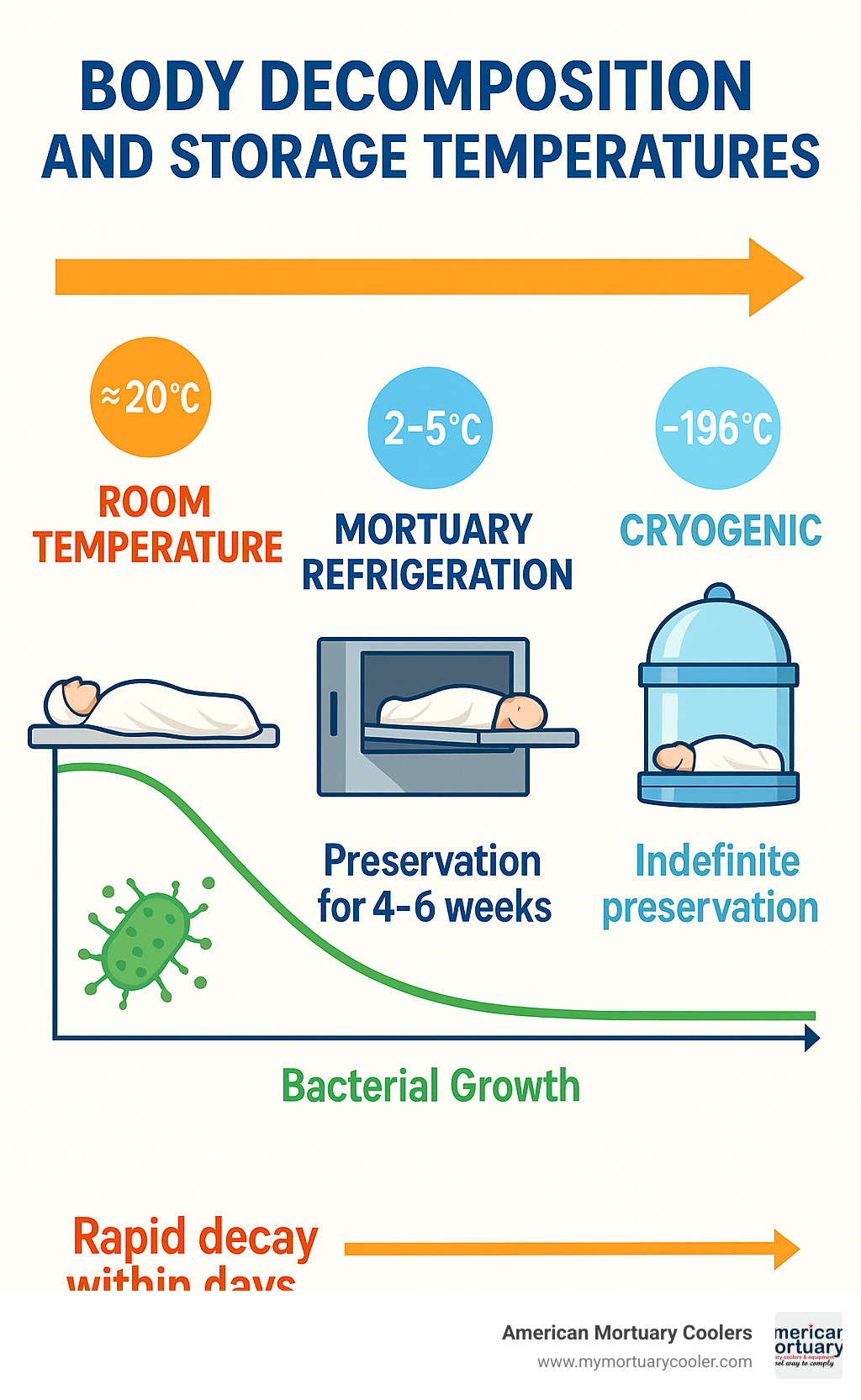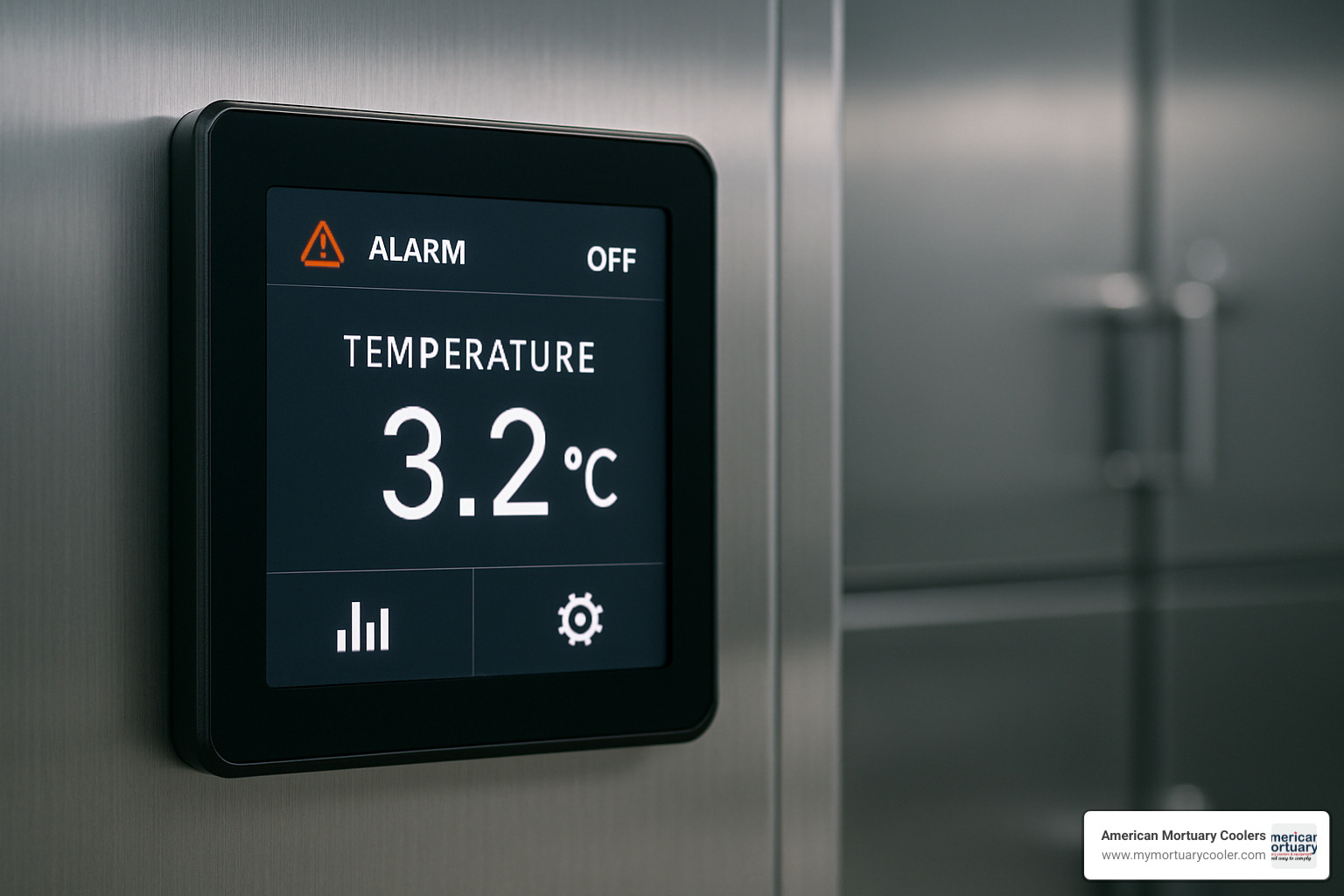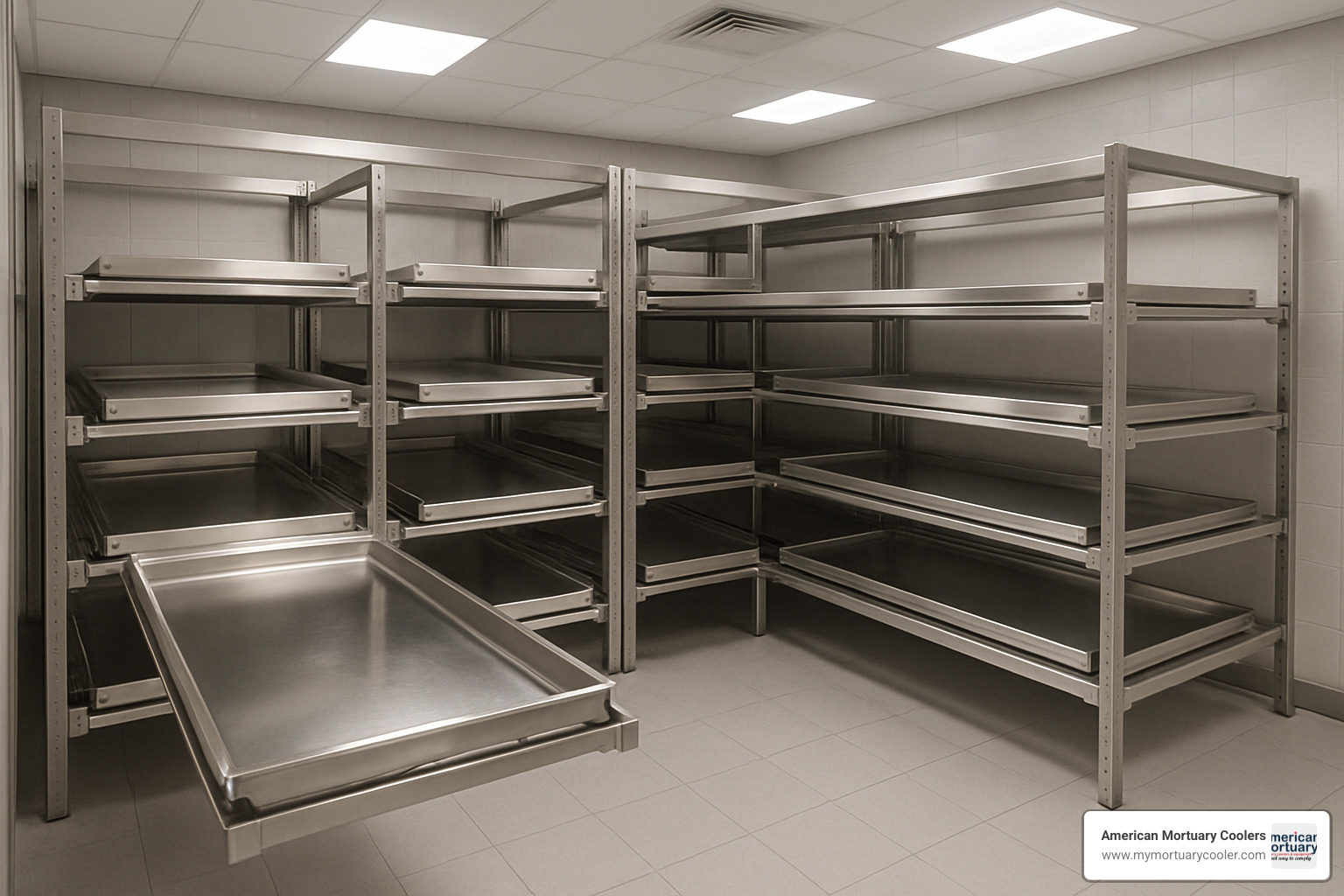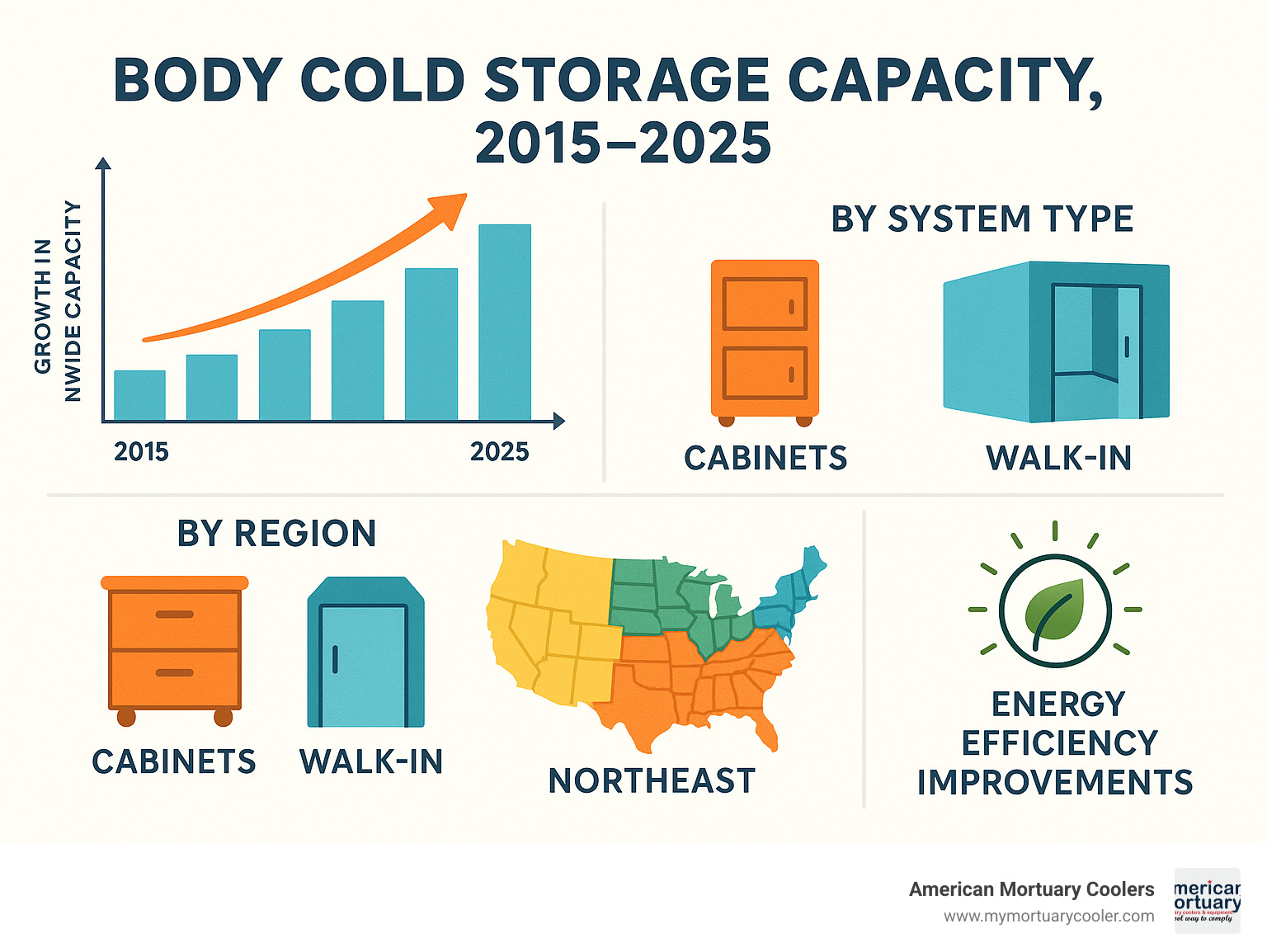Why Body Cold Storage is Essential for Funeral Homes and Morgues
Body cold storage systems are specialized refrigeration units designed to preserve human remains at controlled temperatures between 2°C and 5°C, slowing decomposition while maintaining dignity and public health safety.
Key Facts About Body Cold Storage:
- Temperature Range: 2°C to 5°C (36°F to 39°F) for standard preservation
- Storage Duration: Bodies can be safely stored for 4-6 weeks under proper conditions
- Primary Purpose: Slows bacterial growth and enzymatic decay processes
- Types Available: Mortuary cabinets (1-15 body capacity), walk-in cold rooms, mobile units
- Environmental Benefit: Greener alternative to chemical preservation methods
Body cold storage serves as the backbone of modern funeral services, providing essential time for families to make arrangements, conduct viewings, and accommodate cultural or religious practices. These systems maintain temperatures that significantly reduce the rate of decomposition - refrigeration at 2°C can slow bacterial growth by up to 90% compared to room temperature storage.
The technology has evolved from simple refrigerated cabinets to sophisticated walk-in cold rooms with capacities exceeding 100 bodies, mobile units for emergency response, and cryogenic systems operating at -196°C for specialized applications. Modern units feature antimicrobial surfaces, redundant cooling systems, and energy-efficient designs that comply with federal standards.
As Mortuary Cooler, a national-level mortuary cooler supplier, I've helped funeral homes across America implement reliable body cold storage solutions that balance dignity, efficiency, and regulatory compliance.

Easy body cold storage glossary:
Understanding Body Cold Storage: Definition, Purpose, and Importance
Body cold storage serves as the quiet hero of funeral service, working behind the scenes to preserve dignity and provide families the precious gift of time during life's most difficult moments.
At funeral homes, hospitals, and morgues across America, body cold storage serves as both a public health safeguard and a compassionate tool. It transforms funeral home operations by allowing flexibility that grieving families truly need, whether waiting for relatives to travel or coordinating complex religious ceremonies.
During extraordinary circumstances like the COVID-19 pandemic, these systems become critical infrastructure. Funeral homes with robust cold storage systems, including mobile units, were able to serve their communities with dignity even during the most challenging times.
How Body Cold Storage Keeps Remains Safe and Dignified
Every family's grief journey looks different. Body cold storage honors this diversity by essentially hitting the pause button on natural decomposition, maintaining the deceased's appearance and condition with remarkable effectiveness for weeks when needed.
The chain of custody aspect becomes particularly important in forensic cases. Modern cold storage systems with proper documentation and access controls maintain evidence integrity while preserving tissue samples for potential future testing.
The Science Behind Body Cold Storage
The science behind body cold storage is straightforward. When death occurs, cellular processes trigger enzymatic reactions that break down tissues, while bacterial populations start multiplying rapidly.
At room temperature around 68°F, harmful bacteria can double every 20 minutes. Drop that temperature to refrigeration levels between 36-39°F, and that doubling time stretches to several hours or days. This dramatic slowdown allows bodies to be stored safely for 4-6 weeks under proper conditions.
Enzymatic decay follows similar patterns. For every 18°F decrease in temperature, reaction rates typically halve. By maintaining consistent cold temperatures, we're essentially putting destructive processes into slow motion.
Types of Body Cold Storage Systems and How They Work
When it comes to body cold storage, there's no one-size-fits-all solution. The industry offers everything from compact single-body units for small funeral homes to massive walk-in facilities that can handle over 100 remains at major metropolitan morgues.
Mortuary cabinets are the workhorses of smaller funeral operations. These units store 1-6 bodies in individual compartments, each with its own door for accessing one body without disturbing others. The refrigeration technology is similar to commercial kitchens but with antimicrobial surfaces, precise temperature controls, and heavy-duty construction.
Walk-in coolers and cold rooms step up capacity for facilities needing serious storage. These systems use modular insulated panels that can be assembled into almost any size. The beauty of modular design is flexibility - start with what you need today, then expand later as your business grows.

Mobile trailers and pop-up units have become game-changers, especially after COVID-19. These sophisticated systems can be deployed anywhere you need extra capacity, providing immediate relief during natural disasters, facility renovations, or unexpected surges.
Mortuary Cabinets vs Walk-In Body Cold Storage
Mortuary cabinets shine in smaller operations where individual access matters most. Each compartment has its own temperature zone and compact footprint, perfect for existing buildings where space is tight. For funeral homes processing fewer than 200 cases annually, cabinets typically offer the best value.
Walk-in systems become the smart choice as capacity needs grow beyond 6-8 bodies. The per-body storage cost drops dramatically, and you get operational benefits including flexible interior configuration for oversized remains and better energy efficiency at scale.
| Feature | Mortuary Cabinets | Walk-In Systems |
|---|---|---|
| Best for | <200 cases/year | 300+ cases/year |
| Individual access | Yes | No |
| Expansion capability | Limited | Modular growth |
| Per-body cost | Higher | Lower at scale |
| Space efficiency | Excellent | Good |
| Oversized accommodation | Limited | Excellent |
Mobile & Pop-Up Body Cold Storage Units
Container-based systems emerged as lifesavers during the pandemic. A 20-foot container can hold 16 bodies, while a 40-foot unit accommodates up to 35. They arrive complete with racking, refrigeration systems, and can be operational within hours.
Rental options make surge capacity financially accessible. Instead of buying permanent expansion you might only need occasionally, you can rent additional capacity during busy periods or equipment maintenance.
More info about Cold Storage Options covers selecting the right mobile solution for your specific needs.
Cryogenic and Negative-Temperature Solutions
Forensic facilities often use negative temperature storage between -10°C and -50°C to preserve remains during extended investigations. At these sub-freezing temperatures, decomposition virtually stops, giving forensic pathologists months or years for complex investigations.
Cryonics represents the extreme end at -196°C using liquid nitrogen. The science involves vitrification - preventing ice crystal formation to preserve cellular structures, though this technology remains experimental for human applications.
Latest research on Biostasis Roadmap explores technical challenges in ultra-low temperature preservation.
Temperature Ranges, Regulations, and Best Practices
Getting the temperature right in body cold storage means finding the sweet spot between effective preservation and practical operation. The standard 2-5°C range represents perfect balance - cold enough to slow decomposition dramatically, but not so cold that it creates operational headaches.
The regulatory landscape protects everyone involved. OSHA keeps workers safe with ventilation and protective equipment guidelines. NSF certification ensures mortuary coolers meet food-service grade sanitation requirements. The Energy Independence & Security Act of 2007 drives efficiency standards that have improved insulation and refrigeration technology.

Modern systems build in redundancy because failure isn't an option. Dual refrigeration systems, battery backup power, and remote monitoring prevent disasters. Antimicrobial surfaces with silver ions or copper compounds actively fight bacterial growth while seamless construction eliminates hiding spots for bacteria.
Positive Temperature Body Cold Storage Guidelines
Standard body cold storage at 2-5°C handles 95% of what funeral homes encounter daily. This temperature range provides the 4-6 week storage window that accommodates most scenarios, from quick arrangements to complex situations involving distant relatives.
Temperature uniformity throughout the storage space requires thoughtful engineering. Well-designed systems use multiple sensors and variable-speed fans to maintain consistent conditions everywhere, preventing hot spots that could affect preservation quality.
More info about Morgue Fridge Temperatures dives deeper into temperature management strategies.
Negative Temperature Body Cold Storage Guidelines
Negative temperature body cold storage (-10°C to -50°C) serves forensic investigations and extended evidence preservation. At these temperatures, tissue integrity requires careful handling since ice crystal formation can damage cellular structures.
Frost protection becomes critical below freezing. Modern systems handle this with automated defrost cycles and humidity control that keep things running smoothly without constant attention.
Health, Safety, and Environmental Considerations
Refrigerant choice has evolved toward environmentally friendly options. Leak detection systems monitor for refrigerant escapes with automatic shutoffs and emergency ventilation. Personal protective equipment requirements typically include gloves, eye protection, and respiratory gear.
The environmental benefits of refrigeration versus chemical embalming appeal to families seeking sustainable funeral options, avoiding toxic chemicals in groundwater and reducing worker exposure to hazardous substances.
Scientific research on home-funeral cooling explores alternative preservation methods that further reduce environmental impact.
Selecting, Operating, and Maintaining a Body Cold Storage System
Choosing the right body cold storage system starts with understanding your real needs - not just today's requirements, but where your business is heading. Most successful installations come from honest capacity planning that accounts for seasonal fluctuations and unexpected surges.
I always recommend sizing systems for about 150% of your average daily needs. Most facilities see 25-50% more cases during flu season, and nobody wants to turn families away because they're out of storage space.

Modern body cold storage systems feature remote monitoring that lets you check temperatures from your phone and get alerts if something goes wrong. The modular panel approach allows growing funeral homes to start with current needs and add on later.
Sizing Your Body Cold Storage to Facility Needs
Getting the size right requires examining three years of records for patterns. Most funeral homes see predictable busy seasons - winter months often jump 30-40% higher than summer averages. But you also need to plan for peak demand scenarios like mass casualty events or health crises.
The crossover point usually hits around 300 cases annually. Below that, cabinets make financial sense. Above that, walk-in systems pay for themselves through operational efficiency.
More info about Body Storage in Morgue Fridges walks through the capacity planning process with real examples.
Cost of Ownership: Buy, Lease, or Rent?
Buying makes sense when you're established and planning to stay put - you'll save money over 10-15 years with complete control over specifications. Leasing appeals to growing businesses wanting to preserve working capital with predictable monthly payments. Rental works best for temporary needs or emergency situations.
Key cost factors:
- Initial equipment and installation expenses
- Monthly energy consumption
- Maintenance and service agreement costs
- Insurance and compliance requirements
- Opportunity cost of tying up capital
Energy rebates often provide 20-30% rebates on high-efficiency equipment. Smaller funeral homes handling 100-200 cases annually often find leasing attractive, while larger facilities processing 500+ cases typically benefit from purchasing.
Maintenance & Operational Tips for Long Equipment Life
Well-maintained body cold storage systems run reliably for 15-20 years. Neglected ones often fail within 5-7 years. The difference comes down to consistent, proper maintenance.
Daily temperature logging, visual inspections, and surface cleaning prevent small problems from becoming expensive disasters. Door gaskets deserve special attention - damaged seals can increase energy costs by 30%. Condenser cleaning provides the biggest maintenance value, with most environments needing quarterly attention.
More info about Maintaining Your Cooler provides detailed maintenance schedules and procedures.
Frequently Asked Questions About Body Cold Storage
When families and funeral directors first encounter body cold storage systems, they naturally have questions about how these specialized refrigeration units work. Let me address the most common concerns from real-world experience with facilities ranging from small family funeral homes to large metropolitan morgues.
What temperature should body cold storage be set at?
Body cold storage systems should maintain temperatures between 2°C and 5°C (36°F to 39°F) for optimal preservation. Most facilities prefer the lower end of this range (2-3°C) for extended storage periods or when handling multiple cases simultaneously.
For shorter-term storage when families are making quick arrangements, some facilities operate at 4-5°C for better energy efficiency. The key is consistency over perfection - a system maintaining 4°C steadily outperforms one swinging between 2°C and 6°C.
How long can remains be kept safely in body cold storage?
Under proper body cold storage conditions at 2-5°C, bodies can typically be stored safely for 4-6 weeks. This assumes proper initial handling, consistent temperature control, and appropriate humidity management.
Several factors influence storage effectiveness:
- Initial condition - remains that arrive quickly after death store much longer
- Temperature consistency throughout the storage period
- Humidity control preventing tissue dehydration
- Air circulation and filtration quality
For forensic applications requiring longer storage, negative temperature systems at -10°C to -50°C can preserve remains for months by freezing them.
How do systems accommodate cultural or religious practices?
Modern body cold storage systems offer remarkable flexibility for diverse cultural and religious requirements. Islamic and Jewish traditions typically require burial within 24-48 hours, but cold storage provides preservation for necessary preparation time while maintaining religious compliance.
Buddhist and Hindu practices may require extended time for family gathering and ceremonial preparation. Our systems can maintain remains for weeks while families coordinate complex rituals. Orthodox Christian traditions often involve extended viewing periods, accommodated through adjustable shelving and accessible storage configurations.
We design storage solutions that respect cultural sensitivities while maintaining operational efficiency and regulatory compliance, understanding each community's specific needs.
Conclusion
Body cold storage systems have become the quiet heroes of funeral service, working behind the scenes to provide families with the precious gift of time during life's most difficult moments. These systems do more than just preserve remains - they preserve dignity, enable meaningful goodbyes, and support the complex logistics that modern funeral service requires.
From the smallest rural funeral home with a 2-body cabinet to the largest metropolitan morgue with walk-in facilities storing dozens of remains, every body cold storage system serves the same fundamental purpose: creating space for grief to unfold naturally. Families shouldn't have to rush through final arrangements because of preservation concerns, and these systems ensure they don't have to.
At American Mortuary Coolers, we've spent years perfecting the balance between reliability, efficiency, and compassion in our designs. Our Tennessee-based manufacturing facility produces custom solutions that funeral directors across the contiguous 48 states depend on day after day. We understand that when our equipment works perfectly, families get the time they need to say goodbye properly.
The funeral industry continues evolving toward more sustainable and flexible solutions. Modern systems use 30-40% less energy than older models while providing better temperature control and longer service life. Modular designs let funeral homes start small and expand as their communities grow. Remote monitoring means potential problems get caught before they become crises.
The COVID-19 pandemic taught us hard lessons about surge capacity planning. What seemed like adequate storage became overwhelmed within days in many communities. Today's smart funeral directors are planning for these unexpected surges with mobile units, rental agreements, and emergency partnerships that keep operations running smoothly even during the worst times.
Whether you're opening a new location, replacing aging equipment, or planning for growth, the key is choosing systems that will serve your community reliably for decades. Quality body cold storage equipment isn't an expense - it's an investment in your ability to serve families with dignity and professionalism when they need you most.
Our team understands the unique challenges facing funeral service providers. We've designed systems for tiny mountain towns and major metropolitan areas, each one customized for the specific needs of that community. No two funeral homes are exactly alike, and cookie-cutter solutions rarely work perfectly.
The future of body cold storage looks brighter than ever. New refrigerants are more environmentally friendly. Better insulation reduces operating costs. Smart controls prevent problems before they happen. These advances mean funeral directors can focus on what matters most: caring for families during their time of need.
More info about American Mortuary Cooler solutions provides detailed information about our custom walk-in and cabinet solutions designed specifically for your facility's unique requirements.

When you invest in quality body cold storage systems, you're investing in your community's trust. These systems work quietly in the background, maintaining perfect conditions so you can focus on what funeral service is really about: helping families through their darkest hours with compassion, dignity, and professional care.


















